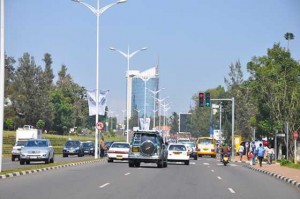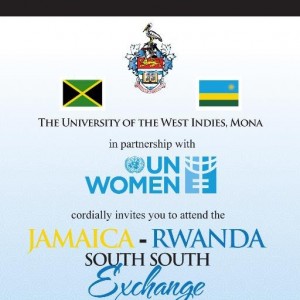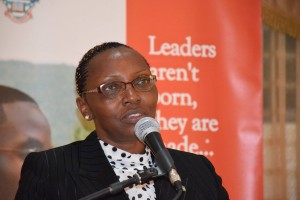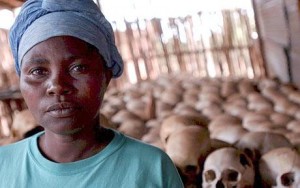
Rwandan Women: Peace Leaders, Advocates and Implementers
November 9th, 2015
“South-South” really does mean something, you know.
To me, it means discovering links, parallels, connections you never guessed would have existed. You are not getting pre-packaged prescriptions from those countries to the North, while you make huge efforts to fit your own experience into the templates they offer, quite often finding them lacking. South-South is organic and creative; the ideas flow, and true dialogue is possible.
So something remarkable and valuable is happening this week. The University of the West Indies (UWI), Mona has partnered with UN Women and UWI Leads for a Jamaica-Rwanda South-South Dialogue, under the theme: “Substantive Equality, A Vision for the Future.” The special guest for the intense two-day program of activities is Hon. Juliana Kantengwa, M.P., a Member of the Rwandan Parliament and former Vice President of the Pan-African Parliament.
It was a bright and humid Monday morning on the UWI Campus. Deputy Principal of UWI Professor Ishenkumba Kahwa welcomed us, and Nadeen Spence of Mary Seacole Hall and the Young Women’s Leadership Initiative introduced us to Ms. Kantengwa (who, by the way, keeps her “woman’s name” despite being married – Rwandan names are gendered).
I believe this sharing of experiences – this exposition of “where equality stands now in our countries” – often includes a large dose of inspiration. On the one hand, Ms. Kantengwa expressed her delight at discovering that, despite the weight of the island’s history of colonialism and slavery, Jamaicans are full of positive energy. Jamaica, on the other hand, may well be astonished at the progress Rwanda has made in throwing off its quite recent, deadly past – the genocide of 1994.
During that period, over a million Rwandans (perhaps as many as 3/4 of the minority Tutsi population as well as thousands of moderate Hutu) were murdered (and horribly maimed) by extremists of the Hutu majority in just 100 days. Over 100,000 children were separated from their families or orphaned. The streets were filled with these lost children, with dead bodies and starving dogs. “In 1994, we were almost no country at all. We were nothing,” Ms. Kantengwa said. This was a blunt statement of fact.
Yet, after the darkness passed, there was an even more important story to tell: that of resilience, of the resurgence of the human spirit, and in particular, the remarkable role women played in helping the country get back on its feet. In the aftermath of the genocide, Ms. Kantengwa (a trained veterinarian) decided to assist in the huge task of finding the children’s families. It was more urgent and important than treating animals. In the end only 3,000 out of the 100,000 remained displaced.
You can have no reconciliation without forgiveness. For some reason, Ms. Kantengwa observed, men were more likely to “retain their anger.” With that anger still under the surface, there was no way forward. So the women took the first step in the direction of peace. “The women went out and started greeting their neighbors,” said Ms. Kantengwa. A simple, almost symbolic gesture perhaps, but: “They moved beyond the ethnic divide. The women were the first to do so.” And so it continued, after the genocide. The women kept moving forward, in many spheres.
For a start, there was affirmative action. By law in Rwanda, women must occupy at least thirty per cent of the seats in government, including local government. Currently, 63.8 per cent of the Lower House consists of women representatives. Compare this with the average for the Caribbean (18.5 per cent), with Jamaica well below that average at thirteen per cent. “We ‘leapfrogged’ into Parliament,” Ms. Kantengwa said. They skipped many of the interim steps towards gender equality – those slow “baby steps” that happen over many years. As a result of seeing more women’s faces in leadership positions, “women became more confident,” and began speaking out and advocating for change. Women are good at advocacy and “influencing,” said Ms. Kantengwa. In the political sphere, they have a “cross-cutting” caucus they can turn to for support and advice.
So, women now have the right to own land and property. When they marry they can choose to share their assets with their husband or keep them separate. This is a far cry from the traditional dependence on the husband in all matters related to money and property. Women and men have equal treatment before the law in terms of marriage and divorce also; and there are other examples.

Rwanda’s capital city, Kigali, has a population of just over one million. Its streets are, by all accounts, pristine. (Photo: staycuriousdarling.com – blog)
Then there are the “small things,” as Ms. Kantengwa called them. When asked about the strict laws banning plastic bags in Rwanda – an initiative of women leaders – she told us proudly that Kigali is now the “cleanest city in Africa.” She also cited laws against smoking in public (which Jamaica recently passed), noting that men did not see this as a major issue. “Such small things, women are good at,” said the MP. And small things do matter.
One final note on gender-based violence, which has reached almost epidemic proportions in many parts of the world. Jamaica certainly hasn’t got a handle on this issue, at all. “The residual patriarchy is still strong in rural areas,” noted Ms. Kantengwa. Country dwellers are always slow to change. However, gender-based violence is a crime, and there is a “gender desk” at each police station. There are also “one stop centers” with specially trained police to address violence against women, including rape.
Finally, a Gleaner reporter asked: “What words of advice would you have for our Prime Minister, going into general elections?”
The Rwandan MP’s response was immediate. “She needs a critical mass of women around her.”
As the example of Rwanda has shown, women working together, with the support of men, will uplift a nation.
Tags: advocacy, Africa, Caribbean, children's rights, gender equity, gender-based violence, genocide, Ishenkumba Kahwa, Jamaica, Juliana Kantengwa, Member of Parliament, Nadeen Spence, peace-making, plastic bags, Prime Minister, Rwanda, South-South, sustainable development, UN Women, University of the West Indies, women's leadership, Young Women's Leadership Initiative
The Gleaner reserves the right not to publish comments that may be deemed libelous, derogatory or indecent.
To respond to The Gleaner please use the feedback form.
- We Are the Zoomers
- Living Online with Humans and Birds: NAOC 2020
- Human Trafficking and the Problem of Public Education
- Down Memory Lane
- Are We Ready to Recover from COVID-19?
- Road Safety Matters: Is Your Vehicle Safe?
- Sexual Harassment, Me Too, and the Minister’s Disturbing Giggle
- The Vulnerable Senior Citizens, Private Care Homes and COVID-19
- A Muddle Over Masks
- Here is Something Life-Saving You Can Do: Give Blood!





